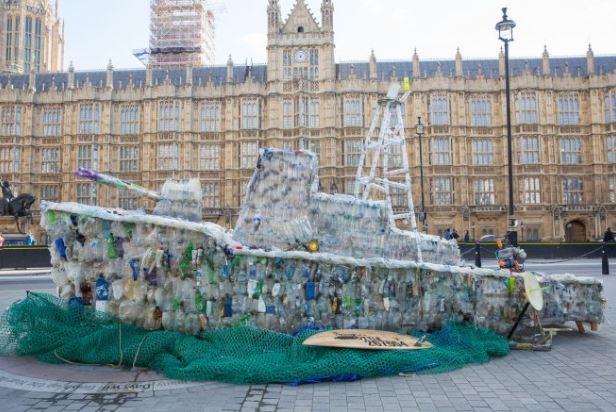Defra thinking on the forthcoming Resources & Waste Strategy, including the possibility of an incineration tax, is to be shared at a roundtable meeting this afternoon (26 September) to be attended by secretary of state, Michael Gove.
The roundtable will see discussion of a number of topics including opportunities for innovation and how to drive sustained action involving the government, the private sector and the public at large. And, regulation will also be on the table with a focus on boosting creativity in the private sector.
Treasury and tax
The meeting comes as separately the possibility of an incineration tax on energy from waste plants emerges as a potential fiscal option to be introduced by the Treasury alongside the strategy.

Cornwall-based Surfers Against Sewage created this ship made from plastics collected on beaches and took it to Parliament this summer
The idea of an incineration tax, which is currently being assessed by Treasury officials, is seen as its action in response to the record number of public responses to its “tackling the plastic problem” consultation. The incineration tax is being seen as an alternative to a tax on single use plastics as it would be easier to implement.
‘Scandal’
A summary of the responses was published on 18 August 2018. That day the Exchequer Secretary, Robert Jenrick, while visiting a plastic pollution clean-up operation on Perranporth Beach in Cornwall, said: “Tackling the scandal of plastic pollution is one of our top priorities and we know the public is right behind us. I’ve been overwhelmed by the public support and the responses we’ve received will be invaluable as we develop our plans for using the tax system to combat this.”
The Treasury pointed out in August that respondents from across the supply chain suggested a tax on the incineration of waste. “This could be done based on input tonnages or the material composition of waste, or using some form of emissions metric. However, there was recognition that this might impact certain sectors, such as cement kilns who currently substitute conventional fossil fuel with residual waste and tyres.”
At least two options are thought to be being discussed, an incineration tax in various forms or a tax on virgin polymers.
Polymers
Those in favour of the tax on virgin polymers consider that it would work better than an incineration tax since it incentivises the use of recycled polymers. This approach is thought to be favoured by the Local Government Association which has indicated that an incineration tax sits in the wrong part of the chain as it does not stop or reduce the consumption of single-use taxes.

A variety of approaches to an incineration tax are being considered by Treasury officials (pictured: the Cornwall Energy Recovery Centre run by SUEZ)
However, the Treasury is thought to be promoting the idea of the incineration tax as a simpler option by putting an extra cost on the disposal of materials, such as plastics, which might have been recycled instead.
The tax could be a blanket tax on energy from waste plants or could be set to target plastic inputs as a percentage of the feedstock or even based on plant emissions relating to the volume of plastics burnt.
Local authority support
The money raised from the tax might go towards extra local authority support for recycling projects or communications or even towards a recycling commodities scheme being proposed in the strategy. Critics point out, though, that increases in the Landfill Tax in the past for a few years went to help fund higher employer National Insurance contributions, but this came to an end and the tax receipts just stayed with the Treasury.
Crime
There are also concerns that a tax on incineration, which is likely to have to be applied to exports of RDF (refuse-derived fuel) could lead to increases in flytipping with the costs of waste disposal a factor behind waste crime.
- Likely contents of the Resources and Waste Strategy were indicated in outline by resources minister Therese Coffey at the Environmental Audit Committee earlier this month (see letsrecycle.com story)
The post Gove to attend strategy meeting as tax idea surfaces appeared first on letsrecycle.com.
Source: letsrecycle.com Plastic


